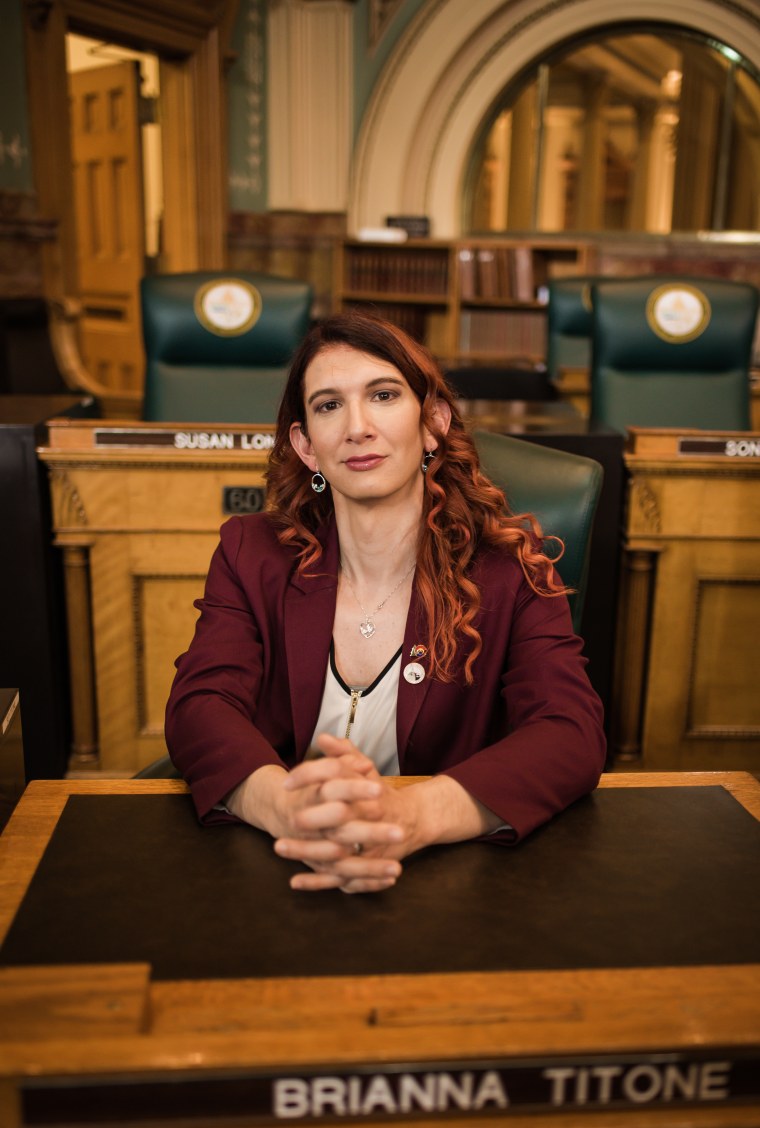When Colorado State Rep. Brianna Titone envisioned her future, she could see a pathway to Washington. As one of only eight out transgender state lawmakers in the country, she knew she could make history as the first elected to Congress.
But when the opportunity came, she didn’t take it.
Titone, 44, is still unraveling what she’s lost and gained by deciding last month not to run for the congressional seat in Colorado’s 7th District. A surprise retirement by Democrat Ed Perlmutter put the seat in play after 15 years, sending a jolt through Colorado’s political establishment and stunning Titone herself.
“I wanted this opportunity to come later,” Titone said. After only three years in the state house, she felt hadn’t yet built the connections and profile needed to launch a successful congressional campaign. As chair of one committee and assigned to three more, she said couldn't pare down her workload to make time to run. And she felt hamstrung by the built-in advantage of her colleague in Colorado’s upper chamber, State Sen. Brittany Pettersen, who had run for the congressional seat in 2018 and jumped into the race again.
While the prospect of being elected Congress’s first out transgender lawmaker and achieving an equality milestone was tantalizing, Titone said she ultimately couldn’t make peace with a very real downside: She might not win.
“I had to weigh what I do now and what I represent for people now, and whether I wanted to risk giving up that to run for another seat,” Titone told Know Your Value, acknowledging that she wasn’t sure a win was likely. “If I didn't, I would lose what I have now and the impact and the difference that I make to people in the position that I have currently.”
Titone grew up in the Hudson Valley of New York and moved to Colorado more than a decade ago. She holds Masters degrees in Geochemistry and Information Communication Technology, and she’s worked as an environmental consultant, a substitute teacher, a web application developer, and a volunteer firefighter. Her political career didn’t start until 2016 when she became involved in local politics and served as a delegate for Bernie Sanders. A year later, she joined the leadership board of her local LGBTQ+ caucus.

Growing up, Titone remembers being told by therapists that she wasn’t transgender. The word itself felt taboo, and even professionals didn’t know how to talk about the topic. At a loss to label her identity, she began calling herself a crossdresser. She hardly saw anyone on TV or in movies who she identified with, and when she did, they were portrayed in a negative light. She says it took many years for her to even begin paying attention to the LGBTQ community, and she didn’t come out until she was in her late 30s. Now, she lives with her wife and their dog.
“I didn't want to give anybody any suspicions that because I was trying to hide who I was so much,” she remembered feeling. “When you don't see yourself in a place you're afraid to be yourself in a place.”
As one of only eight out transgender state lawmakers, Titone is keenly aware of the spotlight that trails her. She also feels a sense of responsibility to the trans community that extends far beyond her Colorado district’s borders.
“It feels like a separate job of being that person who shows up and is inspirational and is outspoken on [trans rights] issues, because there's a short supply of people who have positions like mine to actually do it,” she said.
It’s why on any given day, Titone could be accepting an invitation to speak to students at a community college, or answering a parent’s emailed question about health care for their trans child, or advising students facing opposition to forming a Gay-Straight Alliance at their school. In many cases, Titone doesn't have the answers they seek — but she knows where to direct them or who to introduce them to.
She acknowledges that these efforts can be taxing and tiresome. But in fact, part of why she won’t try to climb the political ladder right now is because a lost congressional race could make it all go away.
“You know, that this kind of representation is really precious right now,” Titone said, “especially since the last couple years have been so prolifically horrible with the legislation that's come out against trans people.”
According to the Human Rights Campaign, state legislatures launched 147 measures targeting the transgender community last year — nearly twice as many as in 2020, when proposals aimed to govern everything from which high school sports trans teens could participate in to which bathrooms they could use.
While Colorado isn’t the flashpoint for many of these state and local battles, Titone says fear has seeped into her state’s trans community. In other instances, she hears from people in other states who “are scared and are reaching out to anybody who wants to help.” She has succeeded in running op-eds outside Colorado to explain how bills are discriminatory.
“It's necessary because we can't just take this abuse,” she said. “We have to fight back.”
While that fight compels her to seek higher office and speak up on behalf of trans rights through a larger megaphone, she also knows she can’t risk losing the influence she has right now.
“There's so much injustice happening,” she said. “And there's nobody who's an elected official, who has the platform that that level of government has, to really talk to people about the importance of why we should have equality for trans people and not be taking away rights of people who aren’t doing anything wrong.”
“Representation matters. I mean, it really, really does,” she said. “And I get a lot of people telling me in the role that I do now, whether I represent them or not, whether they're in the same state or not, I get people from all over telling me that: That it's important that I'm here.”
“It's even more important to have somebody in Congress,” she said. “But it's just not going to be me right now.”
